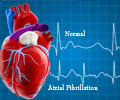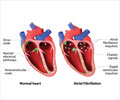World Heart Rhythm Week: Atrial fibrillation (AFib) is set to affect more than 14 million people over 65 in the EU by 2060, reveals a new study.

‘Atrial fibrillation (AFib) is more likely to affect 14 million over 65 in the Eu by 2060. So, on this World Heart Rhythm Week, let's take an extra mile to follow healthy dietary and lifestyle habits to fight this devastating heart rhythm disorder.’
Read More..




Atrial fibrillation is the most common heart rhythm disorder and accounts for 0.28% to 2.6% of healthcare spending in European countries. Patients with atrial fibrillation have a five times higher risk of stroke. And 20% to 30% of strokes are caused by atrial fibrillation. Strokes due to atrial fibrillation are more disabling and more often fatal than strokes with other causes.Read More..
The study estimates that 7.6 million people over 65 in the EU had atrial fibrillation in 2016, and this will increase by 89% to 14.4 million by 2060. Prevalence is set to rise by 22%, from 7.8% to 9.5%. The proportion of these patients who are over 80 will rise from 51% to 65%.
"Atrial fibrillation patients over 80 have even greater risks of stroke, so this shift in demography has enormous implications for the EU," said study author Dr. Antonio Di Carlo, of the Italian National Research Council, Florence, Italy. "Older patients also have more comorbidities linked to atrial fibrillation such as heart failure and cognitive impairment."
Prevention of atrial fibrillation is the same as for other cardiovascular conditions. This includes not smoking, exercise, a healthy diet, keeping alcohol under moderation, and controlling blood pressure and diabetes.
Screening for atrial fibrillation is important because oral anticoagulation effectively prevents strokes in these patients. Dr. Di Carlo said GPs should opportunistically screen for atrial fibrillation by performing pulse palpation during every consultation. Patients with an irregular pulse would have an electrocardiogram (ECG) for confirmation. "The majority of older people see their GP at least once a year, so this is an efficient and effective method to diagnose atrial fibrillation and prevent complications," he said.
Advertisement
To calculate the numbers of atrial fibrillation patients over 65 anticipated in the EU in the next four decades, the researchers first measured the prevalence in a representative sample of people over 65 in Italy. They then used population projections from the statistical office of the EU (Eurostat) for all 28 Member States. The study was funded by the Italian Ministry of Health, National Centre for Disease Prevention and Control.
Advertisement











